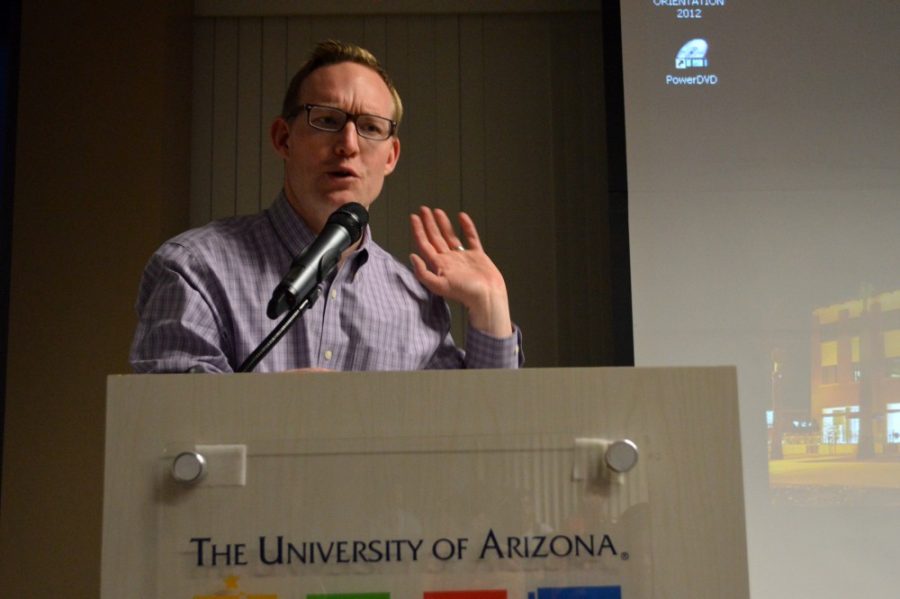A UA alumnus speculated on the future of news with the UA community Wednesday night.
Ryan Gabrielson, a UA journalism alumnus and Pulitzer Prize winner, returned to campus to give a speech to students on the importance of investigative journalism and the future of news.
Gabrielson, 32, attended the UA for four years, where he worked as a news reporter and news editor at the Arizona Daily Wildcat. He left in 2003, without graduating, to move to Texas with his then-girlfriend, now wife, also a UA alumna. Upon arriving in Texas, Gabrielson caught a break when a local newspaper, The Monitor, fired someone suddenly and hired him to fill the position.
“I was making far less than anyone else there. I couldn’t get anybody to pay attention to me,” Gabrielson said. “The degree is that first chip you get to put in. I have a kind of perverse sense of pride that I made it without that, but it’s not advisable.”
He worked as a staff writer at The Monitor for one year and then moved back to Arizona to work for the East Valley Tribune in Maricopa County. Gabrielson worked there for five years, and it was there that he won a Pulitzer Prize for Local Reporting, as well as a Polk Award.
“If you can choose someplace to start a career, go someplace where there’s great news,” Gabrielson said. “Don’t go to the big news outlets.”
Gabrielson won the Pulitzer Prize for an investigative piece he wrote analyzing Maricopa County Sheriff Joe Arpaio and how his concentration on immigration enforcement delayed investigations of other serious crimes. He collaborated with fellow UA alumnus Paul Giblin on this story and eventually proved that the sheriff’s immigration agenda was hindering public safety by creating slow emergency response times.
The East Valley Tribune crumbled soon after Gabrielson won his award, so he decided to accept a one-year investigative reporting fellowship at UC Berkeley.
There, Gabrielson focused all of his energy on investigative journalism.
“It doesn’t really feel like a choice to me. I just love digging,” Gabrielson said. “Certainly I can do daily beat reporting. I’ve done it. I love not only reporting the news, but getting at the bone; I love getting my teeth around the bone and being able to just really explain not only the effect, but the cause.”
After his fellowship, Gabrielson joined a nonprofit news outlet called California Watch, a part of the Center for Investigative Reporting, where he continues to work today. Here Gabrielson published his most recent series, “Broken Shield,” which focused on the corrupt practices and flawed training of a special police force created to protect the developmentally disabled people living in state-run care centers. During his investigation he found that police were ignoring multiple sexual abuse cases and botching ongoing investigations due to a lack of training.
Gabrielson was honored with another award for this investigation, the 2013 Al Nakkula Award for
police reporting, and caused the police force to retrain staff and the state to change laws.
While sharing his past experiences in journalism with the UA campus, Gabrielson also stressed the importance of substantial news and good reporting.
“Journalism that is just repeating things that are already in the public atmosphere has no value because there is no work behind it,” said Gabrielson, “but stuff that is exposed because of a reporter’s legwork will always have value.”
Gabrielson went on to talk about the importance of creating a relationship with sources and never giving up on a story. He gave tips and hints to students looking to go into the field of journalism, but also generalized his techniques to illustrate their importance in any type of journalistic field.
“I hope that it’s inspiring. The kind of work that he’s doing is so important,” said Susan Knight, an associate professor of practice with the UA School of Journalism. “Not everybody has to be an investigative reporter, but I think it’s inspiring to hear the kind of work that he’s doing.”









